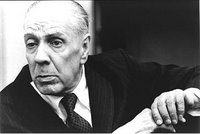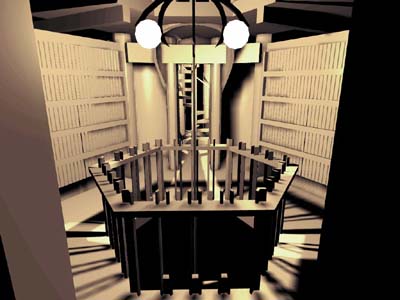 One of the curiosities of Jorge Luis Borges's stories is the way in which they combine the most rarified of philosophical abstractions with an almost obsessive focus on violence, death, and the body.
One of the curiosities of Jorge Luis Borges's stories is the way in which they combine the most rarified of philosophical abstractions with an almost obsessive focus on violence, death, and the body.In one of his earliest books, Historia universal de la infamia (A Universal History of Infamy), Borges is interested in how violence is narrativized: in the semi-mythical narratives that accrete around crime and criminality, preserving but also domesticating our fear of those who live on and transgress society's margins.
"The Widow Ching--Pirate" is particularly concerned with the intersection between storytelling and warfaring. Its plot details the way in which this notorious pirate "queen" is compelled to surrender ultimately not by force, but by her own interpretation of signs both natural and man-made:
The moon grew thin in the sky, and still the figures of rice paper and reed wrote the same story each evening, with almost imperceptible variations. The widow was troubled, and she brooded. (23)The widow feels that she herself has been emplotted in this narrative that she reads in the skies, a narrative slowly coming to its "inevitable end," either "infinite pardon or infinite punishment" (23). And in surrendering she both accepts and influences her fate, choosing to seek pardon rather than punishment, or at least to take her chances.
It is then chance--the unpredictable, undecideable, and indeterminate--that also connects violence and narrative. Texts are constantly subject to "almost imperceptible variations," some of which may have the most dramatic of consequences. "Pierre Menard, Author of the Quixote", though in many ways a playful satire of avant-garde literary pretensions, alerts us to the different interpretations that can be generated by barely (here, absolutely) imperceptible differences between texts:
It is a revelation to compare the Don Quixote of Pierre Menard with that of Miguel de Cervantes. Cervantes, for example, wrote the following (Part I, Chapter IX):Again, we shouldn't forget the comedy here, but Borges returns endlessly to the drastically contrasting outcomes that can be the result of the smallest initial differences: in, for instance, "The Garden of Forking Paths" (and compare the Gwyneth Paltrow vehicle Sliding Doors) or "The South"....truth, whose mother is history, rival of time, depository of deeds, witness of the past, exemplar and adviser to the present, and the future's counselor.This catalog of attributes, written in the seventeenth century, and written by the "ingenious layman" Miguel de Cervantes, is mere rhetorical praise of history. Menard, on the other hand, writes:...truth, whose mother is history, rival of time, depository of deeds, witness of the past, exemplar and adviser to the present, and the future's counselor.History, the mother of truth!--the idea is staggering. (94)
So in "The South," it is not so much that there is any one pivotal moment: there are many, all of which cumulatively lead the plot to its narrative conclusion, and the story's protagonist, Juan Dahlmann, to his untimely end. But each of these pivots on which the story and Dahlmann's fate rests is presented as the lightest of touches: literally so, in the instance of the injury that leads him to septicemia and the sanatorium. "Fate can be merciless with the slightest distractions," comments the story's narrator:
That afternoon Dahlmann had come upon a copy (from which some pages were missing) of Weil's Arabian Nights; eager to examine his find, he did not wait for the elevator--he hurriedly took the stairs. Something in the dimness brushed his forehead--a bat? a bird? On the face of the woman who opened the door to him, he saw an expression of horror, and the hand he passed over his forehead came back red with blood. (174-175)The choices we make only half-aware (taking the stairs rather than the elevator) combine with half-noticed events (a brush on the forehead) to produce unexpected and sometimes fatal results. This particular event is here later mirrored when, in a store in the south of the story's title, "Dahlmann suddenly felt something lightly brush his face" (278). But it would be wrong to say that it is his reaction to this encounter--accepting a young thug's challenge to a fight--that seals his fate. For one thing, what's required is the intervention of yet another "unforeseeable" intervention, a gaucho throwing Dahlmann a weapon; for another, we might also say that our protagonist's conclusion has been inscribed in his ancestry, his grandfather's own death fighting in the south, and the "pull" of that lineage.
Moreover, it's not even as though the story ends so very determinately: it requires the reader to imagine a perhaps inevitable conclusion: "Dahlmann firmly grips the knife, which he may have no idea how to manage, and steps out into the plains" (179; my emphasis).
Finally, "The Library of Babel" examines narrative, and its infinitude, and also the violent passions that it can provoke, with its image of librarians searching for the elusive (but assuredly existent) volume that would vindicate their lives:
Thousands of greedy individuals abandoned their sweet native hexagons and rushed downstairs, spurred by the vain desire to find their Vindication. These pilgrims squabbled in the narrow corridors, muttered dark imprecations, strangled one another on the divine staircases, threw deceiving volumes down ventilation shafts, were themselves hurled to their deaths by men of distant regions. Others went insane... (115)The despairing realization here is of the dark nexus between chance, certainty, and totality. For it to be certain that the library contains precisely the volume that the pilgrims seek, then the library has to be infinite, to contain the totality of all possible books. Which means that the chance of finding that particular text "can be calculated to be zero" (115).
As such, even in the perfectly ordered world represented by the all-encompassing universe that is the library, we are left at best to take, but also then to relish, our chances.

1 comment:
Want To Increase Your ClickBank Traffic And Commissions?
Bannerizer made it easy for you to promote ClickBank products by banners, simply go to Bannerizer, and get the banner codes for your picked ClickBank products or use the Universal ClickBank Banner Rotator Tool to promote all of the available ClickBank products.
Post a Comment